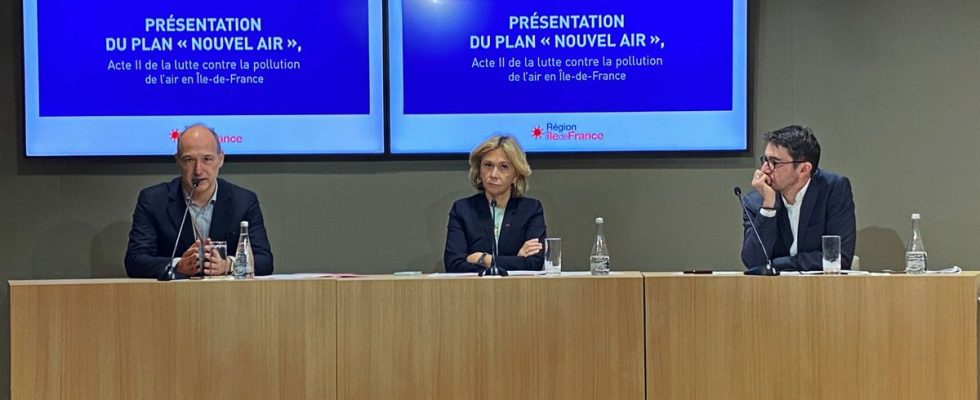Breathe deeply in Ile-de-France. On Tuesday March 21, Valérie Pécresse and her team unveiled the new regional plan for improving air quality, entitled “New air”. A plan that was long overdue. The previous one, “Let’s change the air” in Ile-de-France, dated 2016.
“New” ambitious goals?
According to Valérie Pécresse, the “Let’s change the air” plan, adopted in 2016, has borne fruit. The concentration of pollutants in the air has decreased by 35-40% between 2011 and 2021. However, pollution levels remain above the standards recommended by the World Health Organization (WHO) and the situation continues to deteriorate for the ozone layer. Today, to halve the level of air pollution by 2030, the president of the IDF region is therefore implementing 8 actions to improve air quality in the region.
- Acceleration of the replacement of polluting vehicles
“First, the region will accelerate the replacement of vehicles for craftsmen and small businesses as well as that of delivery businesses, by increasing the ceiling for subsidized vehicles to 5 per craft business and 10 for delivery businesses,” says Yann Wehrling, Vice-President in charge of ecological transition, climate and biodiversity. According to him, the region will support communities of less than 10,000 inhabitants to also be able to change their vehicles. “We’re also going to focus on a technology that we believe very much, hydrogen-powered vehicles,” he adds.
- Air pollution control in transport
“We are going to deploy a budget of 6 million euros to improve the air in the 20 most polluting stations by 2028,” said Yann Wehrling. The Ile-de-France region is investing in cleaner, low-carbon transport.
According to Yann Wehrling, this objective will be achieved via 3 main axes. The first is to improve public knowledge of fine particles. The second aims to develop trains and RERs and reduce pollutants linked to “mechanical braking”. Finally, the third axis is based on the renewal of 40 fans in the metro and the installation of new ones.
- Improved indoor air quality
Olivier Blond, special delegate for air quality, points out that the region is launching an action in favor of air quality inside nurseries, schools and municipal retirement homes. This concerns, in particular, the installation of sensors, purification and ventilation devices. Since 2017, the IDF Region has financed 1,248 CO2 sensors and 532 air purifiers in 38 municipalities for an amount of 394,000 euros.
- Conversion of generating sets
In Ile-de-France, the use of generators, which generate significant levels of pollution, is regulated, explains Olivier Blond. They are used in the context of cinematographic filming, festivals, events, construction sites or as emergency aid for buildings. Thus, the Region wishes to promote the use of non-polluting generators, which operate on solutions based on hydrogen or equivalent.
- Introduction of an allergic risk monitoring system
Given that 20% of children and 30% of adults in France have allergic reactions to pollen and mould, the Region is going to set up, in partnership with the RNSA (National Aerobiological Surveillance Network), a network of electronic sensors capable of identify the pollen present in the air for the pollen season 2.024. The creation of “Alert Pollens Ile-de-France” will provide allergy sufferers with up-to-date information on the pollen situation.

However, the communist ecologist and citizen left remains skeptical about the “New air” plan: “Communication around this plan will be maximum and its content is unfortunately minimal. Nothing new, warmed up, recycling of existing actions, regional or not, ”indicates the opposition. According to environmentalists, no new action has been introduced. “This catalog of good intentions makes it possible to buy good conscience for the executive who avoids mentioning the subjects which annoy and on which the Region should act more”, they added.
In a letter dated October 17, 2022, the Special Delegate for environmental health and the fight against air pollution in the Region, Olivier Blond, proposed to the political groups to contribute to the preparation of the regional plan for improvement in air quality. The Ecologist Pole regrets that its proposals have never been taken into account until now. “Not a word about the heavy goods vehicle eco-tax, nothing about restoring free public transport during pollution peaks removed by Valérie Pécresse. It is therefore not an air plan up to the challenges”.
The opposition promises to formulate in turn “concrete proposals to truly act for the air because it is a serious subject, of public health, on which the public authorities cannot play in the face of the climate challenge and the impact health of human activities”.

